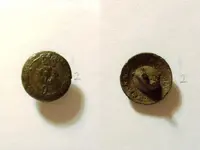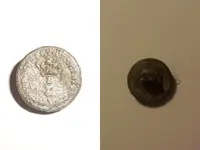Grant or Strathspey Fencibles (1793)The Grant or Strathspey Fencibles were raised when
Sir James Grant of Grant, having offered to raise a regiment, he obtained permission to do so, and two months after the
declaration of war by France, the regiment was assembled at
Forres in the end of April, 1793. With the exception of 41 Scottish Lowlanders, three Englishmen, and two Irishmen, the regiment consisted of Highlanders. On 5 June it was embodied and inspected by Lieutenant-general
Alexander Leslie, marched to the southward in August, and quartered successively in most of the towns in the south of Scotland.[SUP]
[7][/SUP]
Whilst stationed at
Dumfries in 1795, a mutiny broke out amongst the
Strathspey Highlanders. A spirit of jealousy and distrust of their officers had taken deep root in the breasts of the men, in consequence of an attempt that had been made the preceding year at
Linlithgow, to induce them to extend their service, which was confined to Scotland. They erroneously conceived that there was a design to entrap them; a suspicion which appears to have originated in the conduct of the officers, some of whom did not explain the nature of the proposals to their men, whilst others entirely mistook their import and meaning.[SUP]
[8][/SUP]
For a time the good understanding between the officers and the men appeared to have returned; but an incident which occurred at Dumfries rekindled the dying embers of dissension, and led to the most unpleasant consequences. A soldier in the ranks having made a jocular remark, which was considered as offensive by the officers, he and some of his comrades, who appeared to enjoy the joke, were put into confinement, and threatened with punishment[SUP]
[9][/SUP] This injudicious step roused the feelings of the Highlanders, who considered themselves as insulted and disgraced in the persons of the prisoners, and they could not endure that such a stain should "attach to themselves and their country from an infamous punishment for crimes, according to their views, not in themselves infamous in the moral sense of the word".[SUP]
[10][/SUP] The consequence was, that many of the soldiers, in open defiance of their officers, broke out, and released the prisoners.[SUP]
[9][/SUP]
After this unfortunate affair, the regiment was marched to
Musselburgh, when Corporal James Macdonald, and privates Charles and Alexander Mackintosh, Alexander Fraser, and Duncan Macdougall, were tried, and being found guilty of mutinous conduct, condemned to be shot. The corporal's sentence was restricted to a corporal punishment. The four privates were marched out to Gullane Links, East Lothian, on 16 July 1795, and when they had arrived on the ground they were told that only two were to suffer, and that the two Mackintoshes would be permitted to draw lots. They accordingly drew, when the fatal one fell on Charles, who, with Fraser, was immediately shot in presence of the Scots Brigade, (afterwards the
94th regiment) and the Sutherland, Breadalbane, and Grant Fencibles. The others were ordered to join regiments abroad.[SUP]
[9][/SUP]
No other act of insubordination occurred in the regiment, which was disbanded in the year 1799.[SUP]
[9][/SUP]





